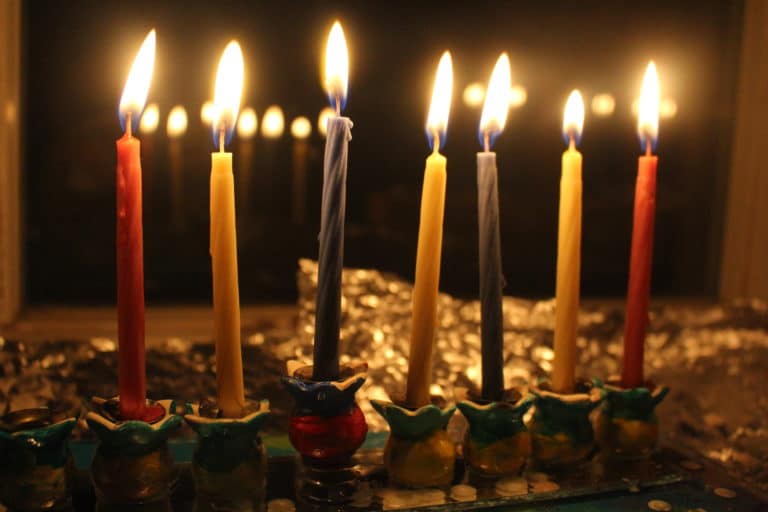
Each day of Hanukkah, our editor Sara Himeles, who recently graduated from rabbinical school, is sharing a teaching and reflection prompt focusing on different themes of the Hanukkah story. Journal your response or simply reflect on each prompt. We hope these teachings and prompts make your Hanukkah brighter and more meaningful.
The Talmud (Shabbat 23a) states that women as well as men are obligated in lighting Hanukkah candles. Explaining this, the famous commentator Rashi writes:
היו באותו הנס – שגזרו יוונים על כל בתולות הנשואות להיבעל לטפסר תחלה ועל יד אשה נעשה הנס:
They were part of the same miracle — when the Greeks decreed that Jewish virgin brides must first be surrendered to the ruler, a woman brought about the miracle.
(King Antiochus IV issued a decree requiring all Jewish brides to sleep with a Syrian Greek officer before they could marry their husbands.)
Who was this woman who brought about the miracle of the Hanukkah story? Although he does not identify her by name, it is likely that Rashi was referring to Judith. Her story is recorded in the Apocrypha (the Apocrypha are ancient Jewish texts from the Biblical period that are not included in the Hebrew Bible), in the Book of Judith.
Judith’s story, as summarized by the Jewish educator and author Erica Brown, goes like this:
“Legend has it that Judith, a young widow who lived at the time of the Maccabees in a town called Bethulia, entered an enemy camp to save her town and prevent the impending siege of Jerusalem. She charmed an army general named Holofernes, who made a large and impressive feast in her honor. When Holofernes was full and very drunk, Judith cut off his head.”
“When the Assyrian army discovered their decapitated leader, they fled in terror,” Rachel Adelman, assistant professor of Hebrew Bible at Hebrew College, explained. “This beautiful widow thus saved Jerusalem from being ravaged… ‘For the Lord Almighty had foiled them by the hand of a woman.’ (Judith 16:5)”
Despite playing such a critical role in the miracle of Hanukkah, Judith’s story was absent from Jewish tradition for over a millennium. Dr. Deborah Levine Gera of the Hebrew University of Jerusalem explained:
“Judith’s story disappeared from Jewish tradition fairly early in ancient times, and there is no trace of the tale in the Dead Sea Scrolls or in the works of Philo and Josephus. She is not mentioned in the Mishnah, Talmud, or other rabbinic literature, and it is only in the tenth (or perhaps the eleventh) century C.E. onwards, over a thousand years after the apocryphal book was first composed, that Judith is found once again in Jewish literature.”
Gera concludes: “Despite her early disappearance from Jewish circles, Judith proved too vital a figure to vanish entirely, and she has left her mark on Jewish texts, prayers, practices, and ritual art.”
Prompt:
Dr. Erica Brown notes that, just like the Hanukkah story itself, the message of the tale of Judith is that “it’s not always the likely candidates who save the day. Sometimes salvation comes when you least expect it from those who are least likely to deliver it.”’
On the sixth night of Hanukkah, think about a few of the “forgotten” heroes in your life. Who are the people who have helped and guided you to reach where you are now? How could you express your gratitude to them? Keep them in mind as you light the candles.
Missed a Hanukkah prompt? Read the prompts for Day 1, Day 2, Day 3, Day 4, and Day 5.
